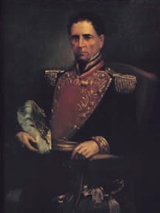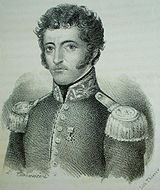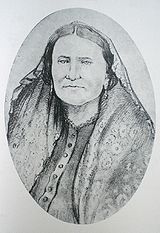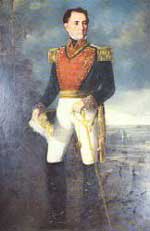
José Tadeo Monagas
Encyclopedia
José Tadeo Monagas Burgos (28 October 1784 - 18 November 1868) was President of Venezuela 1847-1851 and 1855–1858, and a hero of the Venezuelan War of Independence
. Monagas was one of the most unpopular presidents in Venezuelan history, distinguished by his nepotist and favoritism-bound policies, his disregard for laws passed by Congress when he disagreed with them, and the amount of power he attributed to the Executive branch. During his second term, he arranged for a new Constitution (passed in 1858) which would grant him further powers. The administration he set up would eventually lead to a constitutional (and armed) crisis.
As a member of the Liberal Party
, he abolished capital punishment for political crime
s. José Tadeo Monagas also supported his brother José Gregorio
for the presidency.
José Tadeo Monagas and his brother José Gregorio Monagas
combined rule 1847-1858 is commonly referred to as the Monagas Dynasty or "Monagato". It ended with the overthrow of José Tadeo at the hands of Julián Castro
and his allies during José Tadeo's second term.

 Born at Tamarindo de Amana, Maturín
Born at Tamarindo de Amana, Maturín
, his parents were Francisco José Monagas and Perfecta Burgos Villana; they baptized him with the name Judas Tadeo, but by his habit of using only the initial of his first name, he was known as José Tadeo. His father were a merchant Spanish from the Canary Islands
, while that his mother were a native of Cojedes
. He received an education oriented by farm work; Monagas began his military career as second lieutenant of cavalry under the command of Colonel Manuel Villapol in the patriot army of General Santiago Mariño
. In 1813 his Baptism by fire occurs at the battle of Bocas del Pao. The same year, he distinguished himself by his actions against the royal forces led by Lorenzo Fernández de la Hoz, Domingo de Monteverde and José Tomás Boves
in Maturín and Cachipo.
In 1814 he participated in the siege of La Puerta (3 February), the battle of Bocachica (31 March), and the first battle of Carabobo, obtaining the rank of colonel on 28 May. In 1817 he cooperated in the eastern region of Venezuela with Simón Bolívar
, and in 1818, he fought in Calabozo
against Pablo Morillo
, and in the siege of Semen (16 March) and Ortíz, confronted Miguel de la Torre
(26 March). In 1820, he formed part of the attack against Chicual Guzmán on the trenches of Quimiare (2 November). By 1821 he was promoted by Bolívar to General of Division. A year later Monagas obtained the charge of Governor of Barcelona
and Military Commander of the Orinoco, after that he retired to a quiet life in the country. In 1823 Monagas married Luisa Oriach Ladrón de Guevara, daughter of Francisco José Oriach and María Antonia Ladrón de Guevara.
In 1830, Monagas returned to the political and military life, opposing the separation of Venezuela from Greater Colombia, while participating in the so-called Pacification of the East. In 1831, along with his brother José Gregorio
, Monagas promoted the formation of a "State of the East", to be composed by the provinces of Cumaná
, Margarita
and Guayana
. He advocated the establishment of a confederation with the other provinces of Venezuela, as well as those of Greater Colombia.
In May, 1831, in a council of 150 residents of the city of Barcelona, General Santiago Mariño
and Monagas were invested as principal authorities of the State of the East, until the installation of the first congress, which was to be convened later. After that, President José Antonio Páez
stopped this separatist attempt, negotiating with the Monagas brothers, convincing them to submit to central authority. On 23 June 1831, in Valle de la Pascua
, a pardon decree provided the guarantees to the Monagas and the other members of the movement. From that, José Tadeo Monagas retired to private life again.
 In 1834, Monagas elected Doctor José María Vargas
In 1834, Monagas elected Doctor José María Vargas
as president of Venezuela, the military response against the non expected civil power being directed by Monagas, with an armed insurrection in the east, named Revolution of the Reforms. Being this movement suppressed by the government, a new pardon decree signed in the barracks of Pirital in November 1835, put an end to the conflict.
. Being elected by congress on 20 January 1847, he took office on 1 March. His government is characterized by the break with the Conservative Party, and the implementation of a series of measures considered by his opponents as arbitrary. His term was marked by the events of 24 January 1848, which culminated with the assault on the National Congress by supporters of Monagas, and the imposition of his personal power. At the end of this period in 1851, his brother José Gregorio Monagas
was elected President for the 1851-1855 term, this dynasty became known as the Monagato. After the presidency of his brother, José Tadeo was reelected.
An insurrectional movement led by Julián Castro
from the city of Valencia,
forced Monagas to resign the presidency on 15 March 1858.
He received asylum from the French Legation in Caracas, and went into exile a few weeks later.
. At the age of 83, he led the Revolución Azul (Blue Revolution), that overthrew Manuel Ezequiel Bruzual
(interim successor of Falcón), and occupied Caracas
in June 1868. Subsequently, on 27 June, José Tadeo, as General in Chief of the Armies of the Revolution, issued a decree reorganizing the executive administration, and on 30 June, declared valid the existing Federal Constitution of 1864. Finally, he called for new presidential elections, but Monagas (whose candidacy was the strongest), died of pneumonia
during the process in 1868. His remains rest in the National Pantheon of Venezuela since 17 May 1877.
José Tadeo Monagas was a mason in the 33rd degree.
Venezuelan War of Independence
-The First Republic:Criollos resented the mercantilist policies of Spain. Trade was only allowed in Pacific ports which was a terrible burden for Argentina, Paraguay and the Caribbean colonies. This is significant as Cuba and Puerto Rico were forced to allow free trade in 1763 by Britain and...
. Monagas was one of the most unpopular presidents in Venezuelan history, distinguished by his nepotist and favoritism-bound policies, his disregard for laws passed by Congress when he disagreed with them, and the amount of power he attributed to the Executive branch. During his second term, he arranged for a new Constitution (passed in 1858) which would grant him further powers. The administration he set up would eventually lead to a constitutional (and armed) crisis.
As a member of the Liberal Party
Great Liberal Party of Venezuela
The Great Liberal Party of Venezuela was a political party in Venezuela, founded on August 21, 1840 by Antonio Leocadio Guzmán and Tomás Lander, through an editorial published by Guzmán at El Venezolano newspaper....
, he abolished capital punishment for political crime
Political crime
In criminology, a political crime is an offence involving overt acts or omissions , which prejudice the interests of the state, its government or the political system...
s. José Tadeo Monagas also supported his brother José Gregorio
José Gregorio Monagas
José Gregorio Monagas was President of Venezuela 1851-1855 and brother of José Tadeo Monagas.General José Gregorio Monagas was born in Aragua de Barcelona, Venezuela, in 1795. His parents were Francisco José Monagas, a merchant from the Canary Islands, and Perfecta Burgos, a native of Cojedes...
for the presidency.
José Tadeo Monagas and his brother José Gregorio Monagas
José Gregorio Monagas
José Gregorio Monagas was President of Venezuela 1851-1855 and brother of José Tadeo Monagas.General José Gregorio Monagas was born in Aragua de Barcelona, Venezuela, in 1795. His parents were Francisco José Monagas, a merchant from the Canary Islands, and Perfecta Burgos, a native of Cojedes...
combined rule 1847-1858 is commonly referred to as the Monagas Dynasty or "Monagato". It ended with the overthrow of José Tadeo at the hands of Julián Castro
Julián Castro
- See also :*Venezuela*Presidents of Venezuela...
and his allies during José Tadeo's second term.
Early life and career


Maturín
Maturín is a city in Venezuela, the capital of the Venezuelan state of Monagas and a centre for instrumental exploration and development of the petroleum industry in Venezuela. The metropolitan area of Maturín has a population of 401,384 inhabitants...
, his parents were Francisco José Monagas and Perfecta Burgos Villana; they baptized him with the name Judas Tadeo, but by his habit of using only the initial of his first name, he was known as José Tadeo. His father were a merchant Spanish from the Canary Islands
Canary Islands
The Canary Islands , also known as the Canaries , is a Spanish archipelago located just off the northwest coast of mainland Africa, 100 km west of the border between Morocco and the Western Sahara. The Canaries are a Spanish autonomous community and an outermost region of the European Union...
, while that his mother were a native of Cojedes
Cojedes (state)
Cojedes State is one of the 23 states of Venezuela. The state capital is San Carlos.Cojedes State covers a total surface area of 14,800 km² and, in 2007, had an estimated population of 300,300.- History :...
. He received an education oriented by farm work; Monagas began his military career as second lieutenant of cavalry under the command of Colonel Manuel Villapol in the patriot army of General Santiago Mariño
Santiago Mariño
Santiago Mariño , was a nineteenth-century Venezuelan revolutionary leader and hero in the Venezuelan War of Independence...
. In 1813 his Baptism by fire occurs at the battle of Bocas del Pao. The same year, he distinguished himself by his actions against the royal forces led by Lorenzo Fernández de la Hoz, Domingo de Monteverde and José Tomás Boves
José Tomás Boves
José Tomás Boves , royalist caudillo of the llanos during the Venezuelan War of Independence, particularly remembered for his use of brutality and atrocities against those who supported Venezuelan independence...
in Maturín and Cachipo.
In 1814 he participated in the siege of La Puerta (3 February), the battle of Bocachica (31 March), and the first battle of Carabobo, obtaining the rank of colonel on 28 May. In 1817 he cooperated in the eastern region of Venezuela with Simón Bolívar
Simón Bolívar
Simón José Antonio de la Santísima Trinidad Bolívar y Palacios Ponte y Yeiter, commonly known as Simón Bolívar was a Venezuelan military and political leader...
, and in 1818, he fought in Calabozo
Calabozo
Villa de Todos los Santos de Calabozo, an inland town of Venezuela, once capital of the Province of Caracas in the colonial period, formerly in the State of Miranda and former capital of the state of Guárico....
against Pablo Morillo
Pablo Morillo
Pablo Morillo y Morillo, Count of Cartagena and Marquess of La Puerta, aka El Pacificador was a Spanish general....
, and in the siege of Semen (16 March) and Ortíz, confronted Miguel de la Torre
Miguel de la Torre
Miguel de la Torre y Pando, conde de Torrepando was a Spanish General, Governor and Captain General, who served in Spain, Venezuela, Colombia and Puerto Rico during the Spanish American wars of independence and after.At the age of fourteen he joined the Spanish Army as a soldier during the War of...
(26 March). In 1820, he formed part of the attack against Chicual Guzmán on the trenches of Quimiare (2 November). By 1821 he was promoted by Bolívar to General of Division. A year later Monagas obtained the charge of Governor of Barcelona
Barcelona, Anzoátegui
Barcelona is the capital of Anzoátegui State, Venezuela and was founded in 1671. Together with Puerto La Cruz, Lecheria and Guanta, Barcelona forms one of the most important urban areas of Venezuela with a population of approximately 950,000.-History:...
and Military Commander of the Orinoco, after that he retired to a quiet life in the country. In 1823 Monagas married Luisa Oriach Ladrón de Guevara, daughter of Francisco José Oriach and María Antonia Ladrón de Guevara.
In 1830, Monagas returned to the political and military life, opposing the separation of Venezuela from Greater Colombia, while participating in the so-called Pacification of the East. In 1831, along with his brother José Gregorio
José Gregorio Monagas
José Gregorio Monagas was President of Venezuela 1851-1855 and brother of José Tadeo Monagas.General José Gregorio Monagas was born in Aragua de Barcelona, Venezuela, in 1795. His parents were Francisco José Monagas, a merchant from the Canary Islands, and Perfecta Burgos, a native of Cojedes...
, Monagas promoted the formation of a "State of the East", to be composed by the provinces of Cumaná
Cumaná
Cumaná is the capital of Venezuela's Sucre State. It is located 402 km east of Caracas. It was the first settlement founded by Europeans in the mainland America, in 1501 by Franciscan friars, but due to successful attacks by the indigenous people, it had to be refounded several times...
, Margarita
Isla Margarita
Margarita Island is the largest island of the state of Nueva Esparta in Venezuela, situated in the Caribbean Sea, off the northeastern coast of the country. The state also contains two other smaller islands: Coche and Cubagua. The capital city of Nueva Esparta is La Asunción, located in a river...
and Guayana
Guayana Region
The Guayana Region is an administrative region of Venezuela.The region has a population of 1,383,297 inhabitants and a territory of 458,344 km². It borders the independent nation of Guyana which forms part of The Guyanas...
. He advocated the establishment of a confederation with the other provinces of Venezuela, as well as those of Greater Colombia.
In May, 1831, in a council of 150 residents of the city of Barcelona, General Santiago Mariño
Santiago Mariño
Santiago Mariño , was a nineteenth-century Venezuelan revolutionary leader and hero in the Venezuelan War of Independence...
and Monagas were invested as principal authorities of the State of the East, until the installation of the first congress, which was to be convened later. After that, President José Antonio Páez
José Antonio Páez
José Antonio Páez Herrera was General in Chief of the army fighting Spain during the Venezuelan Wars of Independence, in addition to becoming the President of Venezuela once it was independent of the Gran Colombia...
stopped this separatist attempt, negotiating with the Monagas brothers, convincing them to submit to central authority. On 23 June 1831, in Valle de la Pascua
Valle de la Pascua
Valle de la Pascua is a valley and city in the state of Guárico in central Venezuela. It is the seat of Leonardo Infante municipality. Its economy is based on agriculture and cattle ranching. Valle de la Pascua is the economic capital of Guárico state, and is often referred as: "La Princesa del...
, a pardon decree provided the guarantees to the Monagas and the other members of the movement. From that, José Tadeo Monagas retired to private life again.

José María Vargas
José María Vargas was the 4th President of Venezuela from 1835–1836.-Life and career:...
as president of Venezuela, the military response against the non expected civil power being directed by Monagas, with an armed insurrection in the east, named Revolution of the Reforms. Being this movement suppressed by the government, a new pardon decree signed in the barracks of Pirital in November 1835, put an end to the conflict.
Rise to power
In 1846, Monagas was postulated as candidate for the presidency, for the period 1847-1851, with the support of Páez and president Carlos SoubletteCarlos Soublette
Carlos Soublette was President of Venezuela 1837-1839 and 1843–1847, and a hero of the Venezuelan War of Independence....
. Being elected by congress on 20 January 1847, he took office on 1 March. His government is characterized by the break with the Conservative Party, and the implementation of a series of measures considered by his opponents as arbitrary. His term was marked by the events of 24 January 1848, which culminated with the assault on the National Congress by supporters of Monagas, and the imposition of his personal power. At the end of this period in 1851, his brother José Gregorio Monagas
José Gregorio Monagas
José Gregorio Monagas was President of Venezuela 1851-1855 and brother of José Tadeo Monagas.General José Gregorio Monagas was born in Aragua de Barcelona, Venezuela, in 1795. His parents were Francisco José Monagas, a merchant from the Canary Islands, and Perfecta Burgos, a native of Cojedes...
was elected President for the 1851-1855 term, this dynasty became known as the Monagato. After the presidency of his brother, José Tadeo was reelected.
An insurrectional movement led by Julián Castro
Julián Castro
- See also :*Venezuela*Presidents of Venezuela...
from the city of Valencia,
forced Monagas to resign the presidency on 15 March 1858.
He received asylum from the French Legation in Caracas, and went into exile a few weeks later.
Later career
After six years in exile (1858–1864) Monagas returned to Venezuela, and gathered around him the opponents to the administration of President Juan Crisóstomo FalcónJuan Crisóstomo Falcón
Juan Crisóstomo Falcón y Zavarce , was the 20th President of Venezuela as well as military commander during the Federal War. Member of the Liberal party, first served as the supreme chief of a rebel movement in August 1859, but the rebellion was soon crushed. After the Coche treaty, is recognized...
. At the age of 83, he led the Revolución Azul (Blue Revolution), that overthrew Manuel Ezequiel Bruzual
Manuel Ezequiel Bruzual
Manuel Ezequiel Bruzual , was a military leader committed to liberal ideas, also in charge of the War and Navy Ministry in 1864, and in 1868 was designated provisional President of Venezuela.Bruzual participated actively in the Federal War, being known as the Courageous soldier of Federation,...
(interim successor of Falcón), and occupied Caracas
Caracas
Caracas , officially Santiago de León de Caracas, is the capital and largest city of Venezuela; natives or residents are known as Caraquenians in English . It is located in the northern part of the country, following the contours of the narrow Caracas Valley on the Venezuelan coastal mountain range...
in June 1868. Subsequently, on 27 June, José Tadeo, as General in Chief of the Armies of the Revolution, issued a decree reorganizing the executive administration, and on 30 June, declared valid the existing Federal Constitution of 1864. Finally, he called for new presidential elections, but Monagas (whose candidacy was the strongest), died of pneumonia
Pneumonia
Pneumonia is an inflammatory condition of the lung—especially affecting the microscopic air sacs —associated with fever, chest symptoms, and a lack of air space on a chest X-ray. Pneumonia is typically caused by an infection but there are a number of other causes...
during the process in 1868. His remains rest in the National Pantheon of Venezuela since 17 May 1877.
José Tadeo Monagas was a mason in the 33rd degree.
See also
- VenezuelaVenezuelaVenezuela , officially called the Bolivarian Republic of Venezuela , is a tropical country on the northern coast of South America. It borders Colombia to the west, Guyana to the east, and Brazil to the south...
- Presidents of Venezuela
- José Gregorio MonagasJosé Gregorio MonagasJosé Gregorio Monagas was President of Venezuela 1851-1855 and brother of José Tadeo Monagas.General José Gregorio Monagas was born in Aragua de Barcelona, Venezuela, in 1795. His parents were Francisco José Monagas, a merchant from the Canary Islands, and Perfecta Burgos, a native of Cojedes...
- José Ruperto MonagasJosé Ruperto MonagasJosé Ruperto Monagas was President of Venezuela between 1869-1870. Also, he was a son of José Tadeo Monagas.-Biography:...

